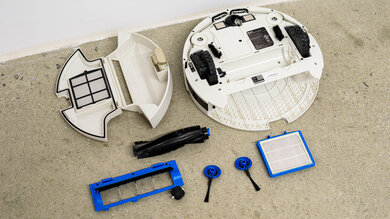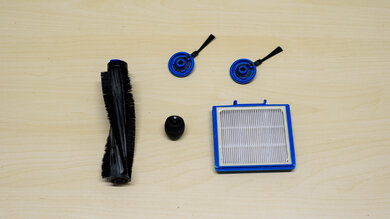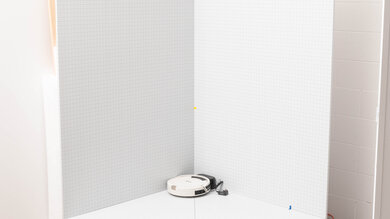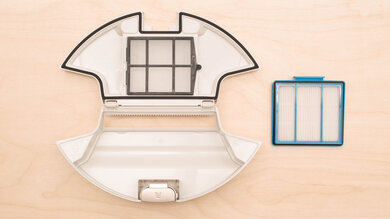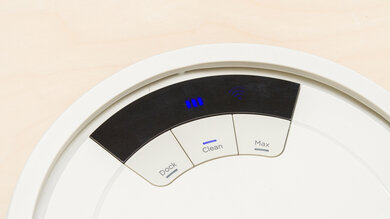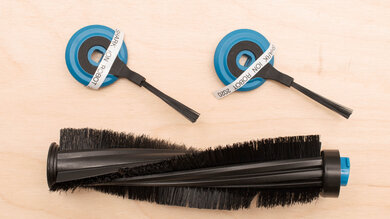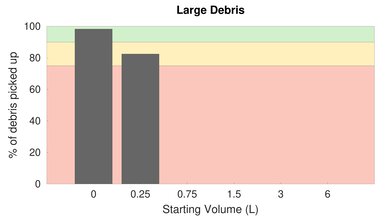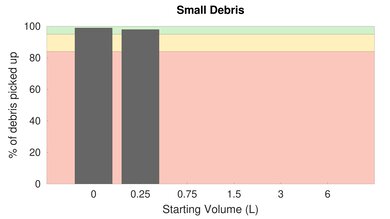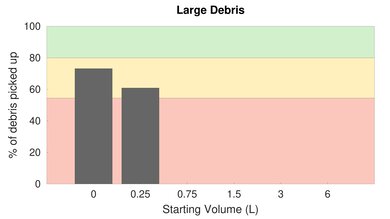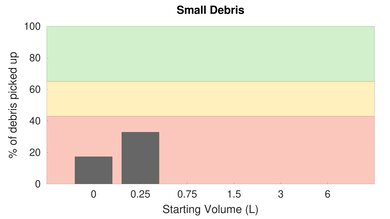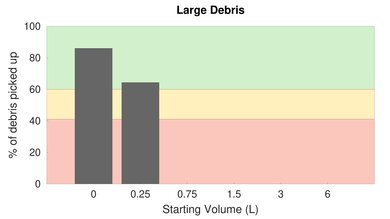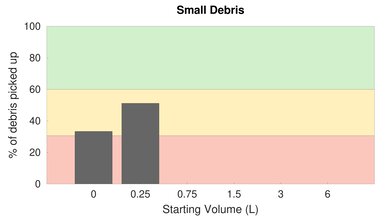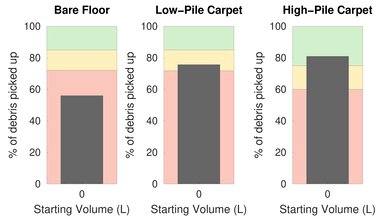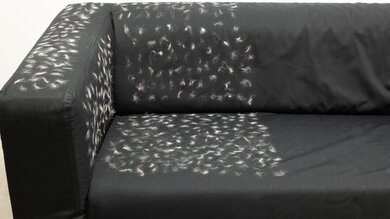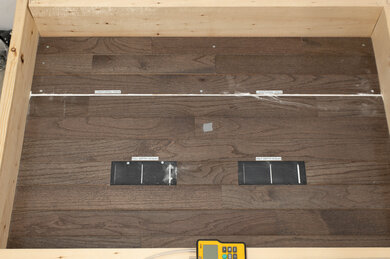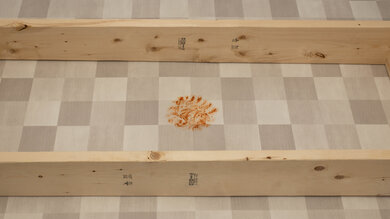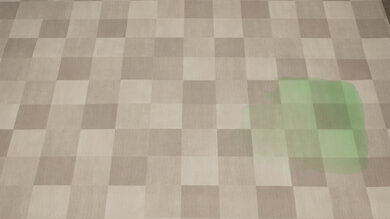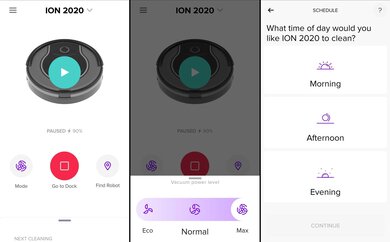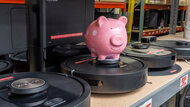The Shark ION Robot AV753 Series is a basic, budget-friendly robot vacuum. It has a rather rudimentary navigation system that relies on random navigation to move around its coverage area, without the room mapping capability found on pricier models in Shark's lineup like the Shark AI Ultra Robot.
Our Verdict
The Shark ION Robot is alright for cleaning bare floors. It feels well-made and clears small and bulky material without too much of a hassle. However, it struggles noticeably with pet hair and is demanding in user maintenance. It also has somewhat rudimentary automation capabilities and a basic navigation system that could cause it to miss some parts of its coverage area.
-
Sturdy build quality.
-
Does a good job of cleaning small and bulky debris on bare floors.
-
Long battery life.
-
Can climb onto high-pile rugs without difficulty.
-
Poor pet hair cleaning performance.
-
Struggles with fine debris.
-
Demanding in terms of user maintenance.
-
High recurring costs.
-
No HEPA filter.
The Shark ION Robot Vacuum is a mediocre option for dealing with messes on low-pile carpet. It struggles with sucking up pet hair, which can become trapped in its brushroll, as well as fine debris on this surface type. It also incurs high recurring costs and has many parts that need regular cleaning. Its brushroll can also occasionally get trapped on rug tassels. Thankfully, it has a long battery life and feels well-built.
-
Sturdy build quality.
-
Does a good job of cleaning small and bulky debris on bare floors.
-
Long battery life.
-
Can climb onto high-pile rugs without difficulty.
-
Poor pet hair cleaning performance.
-
Struggles with fine debris.
-
Demanding in terms of user maintenance.
-
High recurring costs.
-
No HEPA filter.
The Shark ION Robot Vacuum is a passable option for dealing with debris on high-pile carpets. It struggles with pet hair and fine debris and clears only a passable amount of larger material. Recurring costs are high, and many parts need regular cleaning. That said, it can climb onto high-pile rugs without too much difficulty, has sufficient battery life for long cleaning tasks, and feels quite sturdy overall.
-
Sturdy build quality.
-
Does a good job of cleaning small and bulky debris on bare floors.
-
Long battery life.
-
Can climb onto high-pile rugs without difficulty.
-
Poor pet hair cleaning performance.
-
Struggles with fine debris.
-
Demanding in terms of user maintenance.
-
High recurring costs.
-
No HEPA filter.
The Shark ION Robot Vacuum is bad for cleaning up pet hair. Pet hair can get caught in its brushroll instead of being sucked into its dustbin, especially on carpeted surfaces. It has many parts that need periodic cleaning and incurs high recurring costs. It doesn't have a HEPA filter to trap allergens as it cleans, either, which could be an issue if you suffer from serious allergies.
-
Sturdy build quality.
-
Does a good job of cleaning small and bulky debris on bare floors.
-
Long battery life.
-
Can climb onto high-pile rugs without difficulty.
-
Poor pet hair cleaning performance.
-
Struggles with fine debris.
-
Demanding in terms of user maintenance.
-
High recurring costs.
-
No HEPA filter.
The Shark ION Robot Vacuum isn't designed for use on stairs.
The Shark ION Robot Vacuum isn't designed to clean car interiors.
The Shark ION Robot Vacuum isn't designed for use in workshops.
- 6.7 Bare Floor
- 6.0 Low-Pile Carpet
- 6.3 High-Pile Carpet
- 4.1 Pets
- 3.7 Stairs
- 3.9 Cars
- 4.2 Workshop
Changelog
-
Updated Dec 03, 2024:
We've added text to the Airflow box.
- Updated Aug 26, 2024: We've updated the scores in the Hard Floor Pick-Up, High-Pile Carpet Pick-Up, Low-Pile Carpet Pick-Up, and Pet-Hair Pick-Up tests to align with a broader data set. For more information about the reasoning for this update, you can look at our forum post.
- Updated Jul 09, 2024: Converted to Test Bench 0.7.
- Updated Dec 14, 2023: Converted to Test Bench 0.7.
- Updated Apr 19, 2023: We've updated the text in the review to account for the new tests and scoring methodology in Vacuum Test Bench 0.5 and Vacuum Test Bench 0.6.
Check Price
Differences Between Sizes And Variants
The Shark ION Robot AV753 Series comes in three color variants: 'White', 'Gray', and 'Black'. We tested the 'White' variant, and you can see its label here. The model numbers and corresponding colors are listed below.
| Model Name | Color |
| AV751 | Black |
| AV752 | White |
| AV753 | Gray |
If you come across a different variant, let us know in the discussions, and we'll update our review.
Compared To Other Robot Vacuums
The Shark ION Robot AV753 Series is a simple budget robot vacuum. It feels well-made, and its long battery life should allow it to clean large areas without needing to be recharged. It performs best on bare floors but can have some trouble with messes on low-pile carpet or with cleaning up pet hair. Its range of automation features is more basic than those of pricier Shark robot vacuums like the Shark AI Robot.
If you're considering an alternative, take a look at our list of recommendations of the best robot vacuums for hardwood floors, the best budget robot vacuum cleaners, and the best robot vacuums for carpet.
The eufy RoboVac 11S and the Shark ION Robot AV753 Series each have distinct advantages, and one may suit you better than the other, depending on your needs. The eufy clears pet hair more effectively on all surface types and struggles less on low-pile carpet. Meanwhile, the Shark is better built, has a longer battery life, and does a much better job of dealing with bulkier debris like cereal. It also has a companion app, though it's somewhat limited in features and isn't especially intuitive.
The Shark ION Robot AV753 Series is better than the eufy RoboVac 30C. The Shark feels better built, has a longer battery life, and performs better on bare floors as well as low- and high-pile carpets. Meanwhile, the eufy does come with a remote control that allows you to use it without an internet connection.
The Roborock E4 is a far more versatile robot vacuum than the Shark ION Robot AV753 Series. The Roborock feels better built, is easier to maintain, maneuvers around obstructions more easily, and has lower recurring costs, not to mention a broader suite of automation features and a larger dust bin. It also offers superior cleaning performance on all surface types. Conversely, the Shark is a little lighter and more compact.
The Shark ION Robot AV753 Series is slightly superior to the ILIFE A4s. The Shark feels better made, has a much longer battery life, and is more effective on bare floors and high-pile carpets, though it struggles more with pet hair than the ILIFE. The ILIFE is slightly smaller and lighter and does a marginally better job removing fine debris like baking soda from low-pile carpets.
The iRobot Roomba E5 and the Shark ION Robot AV753 Series each have advantages, and one may suit you better than the other, depending on your needs. The iRobot is better built, easier to maintain, and more maneuverable, and it struggles noticeably less on low-pile carpets, especially in regards to pet hair. Conversely, while it charges much faster than the Shark, it has much shorter battery life. The Shark also has a larger dirt compartment and superior performance on bare floors.
The Shark IQ Robot is a better option for most uses than the Shark ION Robot AV753 Series. The IQ clears debris more effectively on all surface types, uses smart-pathing to plot more efficient cleaning routes, and comes with boundary makers to prevent it from moving into certain areas. Meanwhile, the ION has a much longer battery life while taking less time to recharge.
The iRobot Roomba i3 is better than the Shark ION Robot AV753 Series. The iRobot feels better built, has fewer parts requiring regular maintenance, comes with an allergen-trapping HEPA filter, maneuvers itself more effectively, and performs better on all surface types. It also has a far more advanced suite of automation features, most notably its self-emptying feature, which allows it to dump any accumulated debris into a larger dirtbin built onto its charging dock. It's also capable of resuming an in-progress cleaning session after returning to its dock to recharge. Conversely, the Shark is easier to store, incurs lower recurring costs, and has a much longer battery life, though the iRobot charges a lot faster.
The iRobot Roomba 694 is slightly better than the Shark ION Robot AV753 Series. The iRobot has fewer parts that need regular cleaning, incurs lower recurring costs, charges substantially faster, has an automatic surface-type adjustment function, and offers superior maneuverability. However, the Shark has a slightly larger dustbin.
The Shark EZ Robot Self-Empty is better than the Shark ION Robot AV753 Series for most uses. The EZ delivers better performance on bare floors and carpets, maneuvers itself with less difficulty, and has a broader range of automation features. Its external dustbin also gives it a larger, more effective debris capacity. However, the ION has fewer parts that need periodic replacing or maintenance and has a longer maximum battery life, though it does take notably longer to recharge than the EZ.
Test Results
The Shark ION Robot has good build quality. It's mainly made of hard plastic with a matte finish, though its front bumper, drive wheel treads, and swiveling front wheel are made of rubber. It feels quite sturdy overall, though its dustbin feels somewhat fragile, and it could be damaged if you drop it. You may want to consider the iRobot Roomba 692 if you're looking for a better-built alternative.
Out-of-the-box assembly is a fairly simple process, requiring only that you snap the two included side brushes into place and plug in its dock station.
This vacuum has many parts that need regular cleaning, though, thankfully, they're easy to access.
- Brushroll: You can access the brushroll by removing the brushroll compartment door and then pulling the component out. While the manufacturer doesn't specify an exact maintenance interval, you should remove any stuck-on debris or tangled hair regularly.
- Dust bin: You can remove the dust bin by pressing the release button on the rear of the vacuum's body, which allows you to slide it out of its slot. You should empty it after every use. Be sure to remove any stuck-on hair from the integrated anti-tangle comb.
- Pre-motor filter: The pre-motor filter is inside the dust bin lid and can be pulled out via its release tabs. You should clean it weekly by tapping it against the side of a garbage can to dislodge any stuck-on debris.
- Side brushes: The side brushes can be pulled out of their socket by hand. You should check them weekly and remove any tangled hair or stuck-on debris by hand. If necessary, you can also wipe them down with a damp cloth before leaving them to air-dry completely.
- Drive wheels: You should clean the drive wheels and their housing fairly regularly to ensure that there isn't any significant buildup of debris. Make sure that you rotate the wheels while cleaning to ensure no debris has gotten stuck around them.
- Front wheel: The front wheel can be pulled from its socket by hand, but this can be hard, and you may find it easier to use a tool. You should clean it of stuck-on debris regularly.
- Sensors: You should clean the vacuum's sensors periodically with a dry cloth or cleaning brush.
- Charging pads: You should periodically clean the charging pads under the vacuum and on top of the dock station of any dust or debris with a dry cloth or cleaning brush.
The Shark ION Robot has many recurring costs.
- Pre-motor filter: You should replace the pre-motor filter every two months.
- Brushroll: You should replace the brushroll every six to 12 months or whenever you observe visible wear. While this component's model number couldn't be found on the manufacturer's website, a compatible brushroll of a different color is available for purchase.
- Side brushes: You should change the side brushes whenever you notice significant wear.
- Front wheel: You should replace the front wheel every 12 months.
You can purchase any one of these parts, as well as additional accessories, on Shark's website.
The Shark ION Robot has an acceptably-sized dust bin. However, like the Shark IQ Robot, it doesn't have a max fill sensor to let you know once it has reached peak capacity.
The Shark ION Robot's range is limited only by its remaining battery life and the room left in its dirt compartment. Unfortunately, it can't climb or descend stairs.
The Shark ION Robot Vacuum is very portable. It doesn't weigh very much, but it lacks a carrying handle to make it easier to move around.
Battery performance is superb. There isn't a significant difference in runtime between running it continuously in its energy-efficient 'Eco' suction power mode and high-suction 'Max' mode, as it should last for about three hours on a single charge regardless of your choice of setting. This exceeds the continuous runtime of just 60 minutes specified in the vacuum's user guide. The three indicator lights quickly let you know how much battery life is left since they gradually turn off as the charge level drops.
This vacuum has a couple of quality-of-life features. You can swap between three power modes through its companion app: the energy-efficient 'Eco' mode, the default 'Normal' mode, and the high-suction 'Max' mode. Physical buttons on top of the vacuum allow you to select only the 'Max' or 'Normal' modes.
The Shark ION Robot Vacuum has two side brushes that direct debris from the outer edges of the vacuum's path toward its main brushroll.
The Shark ION Robot has good performance on bare floors. It clears bulky and small debris, like cereal or rice, without difficulty. However, it has a very hard time dealing with pet hair on this surface type.
The Shark ION Robot Vacuum performs badly on low-pile carpet. Pet hair can get stuck in its brushroll rather than being sucked into its dustbin, and it picks up very little in the way of fine material like baking soda. However, it's reasonably effective in dealing with larger debris like sand.
This vacuum delivers good performance on high-pile carpet. It can clear away an impressive amount of larger debris like sand within a pass or two.
This vacuum's real-world suction performance isn't very strong. Its suction inlet is positioned too high above the contact surface to generate a tight seal on bare surfaces, though this is the norm for most robot vacuums, and isn't necessarily indicative of poor performance on most surfaces.
While bad relative to a traditional vacuum, this unit has okay airflow performance for a robot vacuum. In practice, it will struggle to deal with large amounts of heavyweight debris.
This vacuum is remarkably quiet. Even with the vacuum running in its 'Max' mode within the same room, you should be able to hear nearby conversations.
The Shark ION Robot is reasonably maneuverable. It uses random pathing to plot cleaning routes, meaning it does occasionally miss some areas or go over the same spot more than once. Thankfully, it's small enough to easily clean under low-lying furniture like tables or couches, and it can climb onto high-pile rugs without too much difficulty, though it can get caught on rug tassels. If you want a vacuum that does a better job of maneuvering itself, consider the iRobot Roomba 614.
Some allergens can escape from this vacuum's exhaust, though this isn't overly surprising given the lack of an on-board HEPA filter.
Physical automation features are limited. Unlike the Shark IQ Robot, it's incapable of mapping out its coverage area and relies instead on random pathing to navigate its coverage area, though this type of basic navigation system is common for a robot vacuum in this price range. Unfortunately, it isn't capable of recognizing magnetic boundary strips that could be used to prevent it from entering certain areas. There's no self-emptying capability either, so you can't pair it with an auto-empty dock to reduce hands-on maintenance requirements. Thankfully, you can enable voice control functions via Google Home or Amazon Alexa devices.
The three control buttons on top of the vacuum can be used to have the vacuum start a cleaning session, return to its dock, or to engage its 'Max' suction mode.
The SharkClean companion app is mediocre in terms of usability and features. You can use it to manually stop and start a cleaning job, change its power mode, send it back to its charging dock, and check previous cleaning history as well as remaining battery life. However, the vacuum's nonexistent mapping features mean that you can't view a coverage map of previous cleaning sessions, set up boundary lines, or send it to specific rooms in your home. Even worse, the app itself isn't especially pleasant to use, with inputs that don't always register and a confusing and convoluted menu system.
Comments
Shark ION Robot AV753 Series: Main Discussion
Let us know why you want us to review the product here, or encourage others to vote for this product.
This product has been merged with Shark ION Robot Vacuum, Wi-Fi Connected with Bonus. Follow the discussion here.



